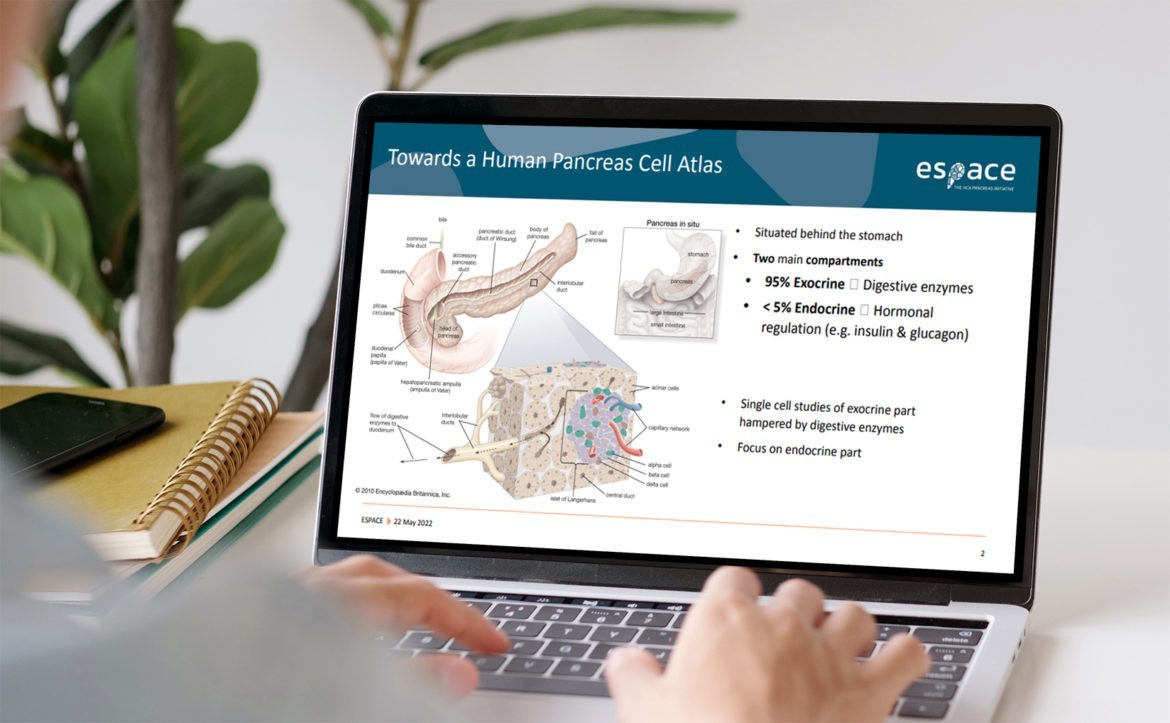On 31 May 2022, ESPACE hosted its second Industry-Academia workshop. Close to 40 participants from the ESPACE consortium, other research centres and the industry attended this online event to learn more about recent developments in single-cell technologies and research with a focus on the pancreas.
The ESPACE consortium is convinced that active partnerships between research projects and industry partners are important to move science forward. Therefore, the event was designed to inform stakeholders about the ESPACE achievements of the last two years, and to facilitate a knowledge exchange about recent technological innovations in the industry that take the field of single-cell technology forward. Eight presentations split into two sessions served as the basis for discussion to explore potentials for joint research and options for future collaboration.
The first session focused on state-of-the-art single-cell technologies and the most recent scientific findings from single-cell analyses on pancreatic tissue. In addition, ESPACE partners from the Technical University Munich presented their histological findings from analysing the healthy adult cohort in ESPACE. The following topics were covered in this first part of the webinar:
- Every Cell Matters: Molecular Cartography™ for atlassing of healthy and diseased tissues by Benedikt Nilges (Resolve BioSciences)
- Integrative analysis of single-cell genomics of the healthy pancreas by Timo Trefzer (ESPACE/ Berlin Institute of Health at Charité)
- Sharing histological findings in the pancreas tissue samples by Felix Schicktanz and Katja Steiger (ESPACE/ Technical University of Munich)
- Using single cell sequencing during process optimization of an iPSC-derived islet-like cluster cell therapy product by Matthias Austen (evotec)
After a short break, the participants resumed the webinar to take a closer look at recent developments in spatial analysis technologies and first spatial analysis findings from ESPACE. This second part of the webinar concluded with two presentations about novel technologies for data processing and an introduction of the ESPACE Cloud, a tool for data management and analysis developed at Charité. In particular, the following topics were addressed:
- Single-Cell Spatial Phenotyping: Setting the pace of Discovery Biology by Virginie Goubert (akoyabio)
- Sharing spatial proteomics to illuminate cell type heterogeneity in pancreas by Anna Martinez-Casals (ESPACE/ KTH Royal Institute of Technology)
- Accelerating Genomics Data Processing with Persistent Memory and Big Memory Software by Michael McManus (Intel)
- ESPACE data in the cloud derived from raw data and images will be presented by Sven Twardziok (ESPACE/ Charité)
ESPACE and industry partners agreed that the event was helpful to bring each other up to speed on recent developments in the single-cell sequencing field. Especially with regards to diabetes research, there are still many open research questions and single-cell analyses can help in bringing this field forward. Some of the studies presented by the industry partners are highly interesting to the ESPACE community and vice versa. The groups have produced complimentary data sets and agreed to follow-up individually after the event to explore options for bringing these data together and potentially initiating future research collaborations.
The event concluded with a discussion round focussing on the potentials of and options for making the data sharing and analysis tools developed in ESPACE available to a broader user group. Discussion around these topics will continue at the ESPACE Final Meeting on 2 June 2022 in Berlin and at the HCA General Meeting which will take place from 27-29 June 2022 in Vienna and online.

